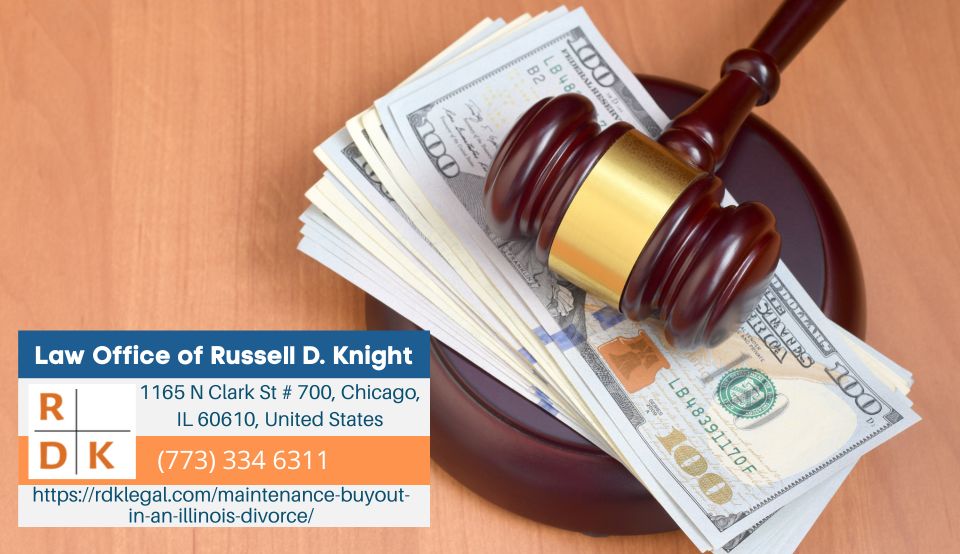Illinois divorce attorney Russell D. Knight (https://rdklegal.com/maintenance-buyout-in-an-illinois-divorce/) of the Law Office of Russell D. Knight has recently published an enlightening article discussing the concept of "Maintenance Buyout In An Illinois Divorce." This comprehensive piece provides valuable insights into how maintenance, formerly known as alimony, can be resolved through a lump-sum payment instead of ongoing monthly installments.
In his latest article, Illinois divorce attorney Russell D. Knight explores the advantages and intricacies of opting for a maintenance buyout. He explains that maintenance in Illinois is typically an ongoing obligation, where one party pays a set amount each month for a predetermined period. However, Knight points out that many individuals prefer to finalize their financial ties with their ex-spouse through a one-time payment. "A maintenance buyout eliminates ongoing contact and the potential for future litigation over maintenance modifications," Knight states, highlighting the appeal of a clean break for both parties.
Illinois divorce attorney Knight discusses the mechanics of calculating maintenance in Illinois. He notes that before determining the maintenance amount, the court must first assess whether maintenance is appropriate. Factors such as the length of the marriage and the financial circumstances of both parties are considered. Knight outlines the guidelines maintenance formula, which is calculated by taking 33 1/3% of the payor’s net annual income minus 25% of the payee’s net annual income, with a cap ensuring the payee does not receive more than 40% of the combined net income of both parties. "These guidelines apply to couples earning less than $500,000 annually combined," Knight explains.
The article further clarifies that for couples with combined incomes exceeding $500,000, the court determines a just maintenance amount after reviewing relevant factors. Once the monthly maintenance amount is established, the duration is then based on the length of the marriage. Knight emphasizes the importance of accurately calculating the total maintenance owed over the course of the parties' lives to determine a fair buyout amount.
To establish the buyout amount, Illinois divorce attorney Knight introduces the concept of net present value (NPV). This financial metric calculates the current value of future maintenance payments, discounted by a rate that often mirrors inflation. "A higher discount rate, as seen in times of high inflation, can reduce the buyout amount, making it advantageous to negotiate a buyout now," Knight advises.
Knight also addresses the court's role in approving maintenance buyouts. He explains that Illinois divorce courts will consider the property each party owns and any marital property apportioned when determining the appropriateness of a maintenance buyout. While property transfers in lieu of maintenance are usually agreed upon by the parties, the court can also order such transfers. "Subsequent case law indicates courts should not order property division in lieu of maintenance," Knight notes, underscoring the complexity of these decisions.
The article discusses the tax implications of a maintenance buyout, noting that it is treated as a transfer of property incident to divorce, with no tax consequences for either party. This is in contrast to pre-2019 tax laws where maintenance payments were taxable to the payee. Knight highlights that the maintenance payor now bears the tax burden on income paid as maintenance, while the maintenance receiver faces no tax impact whether receiving lump-sum or ongoing payments. "This tax relief for the payee often results in them demanding a higher lump sum in exchange for the payor's future tax savings," Knight explains.
Finally, Illinois divorce attorney Knight emphasizes the finality of a maintenance buyout, which converts the maintenance obligation into a non-modifiable property distribution. He notes that while this offers financial certainty for the maintenance receiver, it also means that the buyout cannot be altered, even if circumstances change. "Virtually all long-term maintenance amounts are modified in the future due to changes in employment, remarriage, or other factors," Knight points out, making the buyout an attractive option for those seeking stability.
For those navigating the complex matters of divorce, understanding maintenance buyouts can be crucial. Illinois divorce attorney Russell D. Knight's article provides a thorough overview, helping divorcing parties make informed decisions. Knight encourages anyone considering a maintenance buyout to consult with a knowledgeable attorney to explore their options and secure a fair settlement.
About the Law Office of Russell D. Knight:
The Law Office of Russell D. Knight is dedicated to providing compassionate and informed legal representation in family law matters. Based in Chicago, Illinois, the firm can handle a wide range of cases, including divorce, child custody, and asset division. Led by Russell D. Knight, the firm strives to achieve fair and just outcomes for its clients through diligent legal advocacy and personalized service.
Embeds:
Youtube Video: https://www.youtube.com/watch?v=AlDKjaqW6a8
GMB: https://www.google.com/maps?cid=13056420905624162796
Email and website
Email: russell@rdklegal.com
Website: https://rdklegal.com/
Media Contact
Company Name: Law Office of Russell D. Knight
Contact Person: Russell D. Knight
Email: Send Email
Phone: (773) 334-6311
Address:1165 N Clark St #700
City: Chicago
State: Illinois 60610
Country: United States
Website: https://rdklegal.com/
